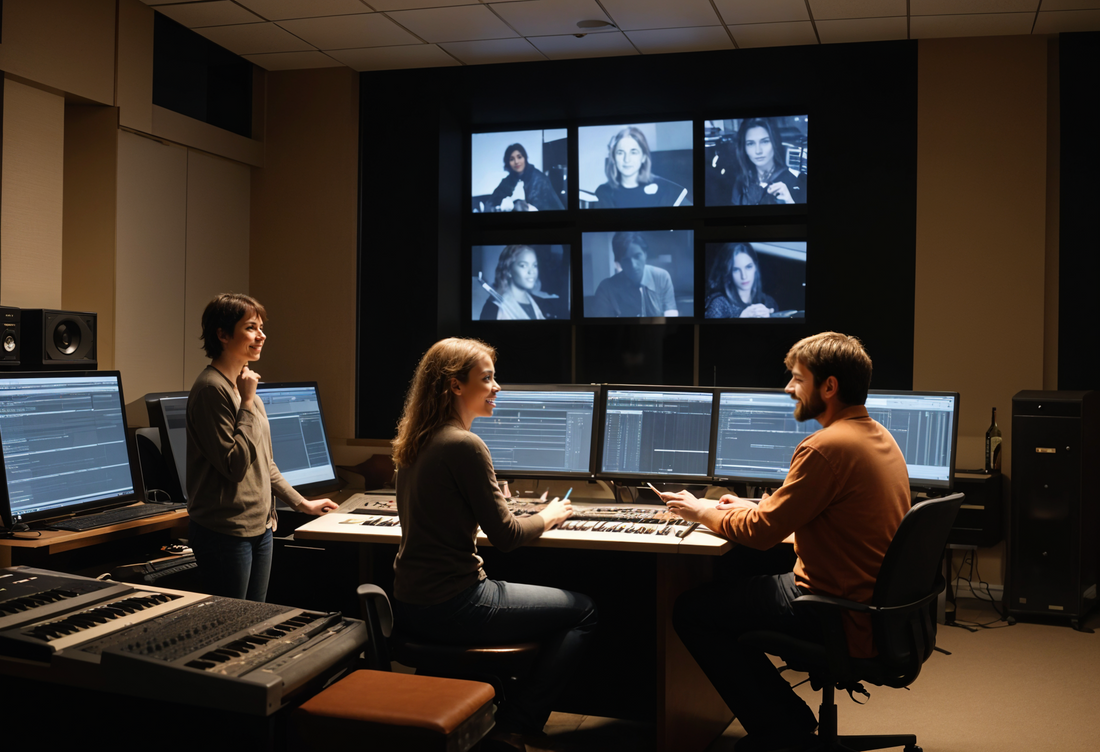Lessons in True Creative Collaboration

There is nothing like being out of your element to realize just how insulated your element is. In this case, I have been working on a documentary film, doing the original music as well as loaning snippets of earlier works of mine to the project. Last weekend we had a session in which the director, editor, and I got together for me to play for them the music I had composed so far to get their feedback regarding mood, timings, and the like.
Even though I pride myself on how much I try to stress collaboration between performers and composers, I was still taken aback with the ease and forthrightness both of these individuals had when talking about the music. “This works great here.” “This part totally does not fit.” “We need a stronger entry”. “That totally captures the energy.” “Can we score this differently?” I had never been in such a workshop setting where everyone felt free to speak so freely about the composition as it was still in its nebulous form.
It was not a one-way street, either. Ironically, I first felt shy about speaking up, as I am new to the film world. I did not know what my place was in the process. However, I soon got into the rhythm and felt free to offer my opinion about music cues, as well as other dramatic aspects of the film. It ended up being one of the most fruitful collaborative session I have been in, with everyone feeling like each of us “got it” when discussing our ideas.
Later in the week, I commented to the editor about the experience and how I was pleasantly surprised at the comfort and freedom both he and the producer/director felt in sharing their thoughts about how to develop the music. I mused about how in the classical music world it is still a challenge to get performers and composers to open up to one another during the creation or rehearsal of a piece. There is still some stigma or assumption associated with the compositional process that inhibits some from feeling that they can speak freely and be a welcomed contributor. To these remarks, the editor said something illuminating, to the effect of, “Well, in film we all look at one another as peers, on an equal footing.”
He is right. We are peers. Equals. The composer is on the same spectrum as the player. While we each have our special training and experience in our respective field, (composing, directing, conducting, playing), in the end, if we are all working on the same composition, ideally there should be a give and take in terms of being able to express one’s idea and be taken seriously. This does not mean that the owner of the work in question is a slave to the other’s suggestions. Ultimately, final creative and pragmatic decisions must lay on his or her shoulders. However I do feel that if such input does takes place, the resulting work will be better for it, as it makes the composer/producer/choregrapher really think and consider aspects of the project in ways perhaps not previously considered.
Another thing to consider is that, while the “peer factor” is a real issue in the new music world, there are other factors at work that I feel the film world does not have. In our history, most of the music performers play is already composed and “completed.” The composer is not present or is even dead. Thus, performance decisions fall fully on the performers. In this environment, a sense of almost romantic deference for the composer has often been applied, sometimes to the point of freezing the performer’s ability to make original performance practice decisions. Because of this, most players naturally do not know how to deal when the composer is there—why or what should they contribute? In the film world, such precedence is not there. In fact, film started its art without the presence of permenant music in the work. If there was music, it accompanied a film live and was often improvised by a living performer. Thus from the onset a composer was either involved after the film had been started or music was added well after the film was completed. If anything, a tendency began in which the composer in a film became like a performer in concert music—we are the last to be brought into the creative process, and thus do not know sometimes quite what to do.
I admit, I got lucky working with the people I am on this documentary. I know there are horror stories of composers being treated like automatons on media projects, just as there are horror stories of composers treating players as automatons on music projects. However, I still think that overall we can learn a lot from film about how to incorporate everyone involved in a project on a more inclusive creative footing and thus make a much higher quality piece of art than otherwise would have been created.
